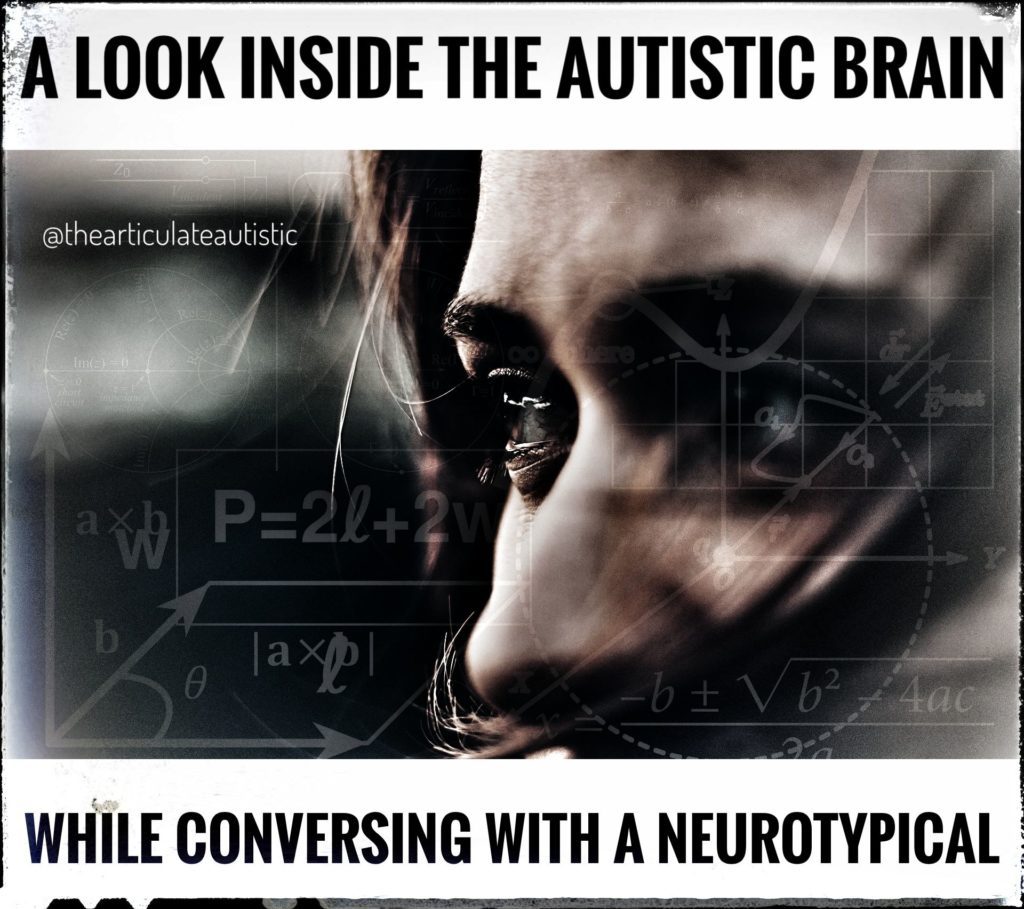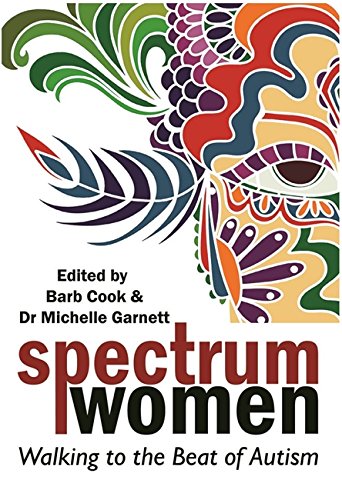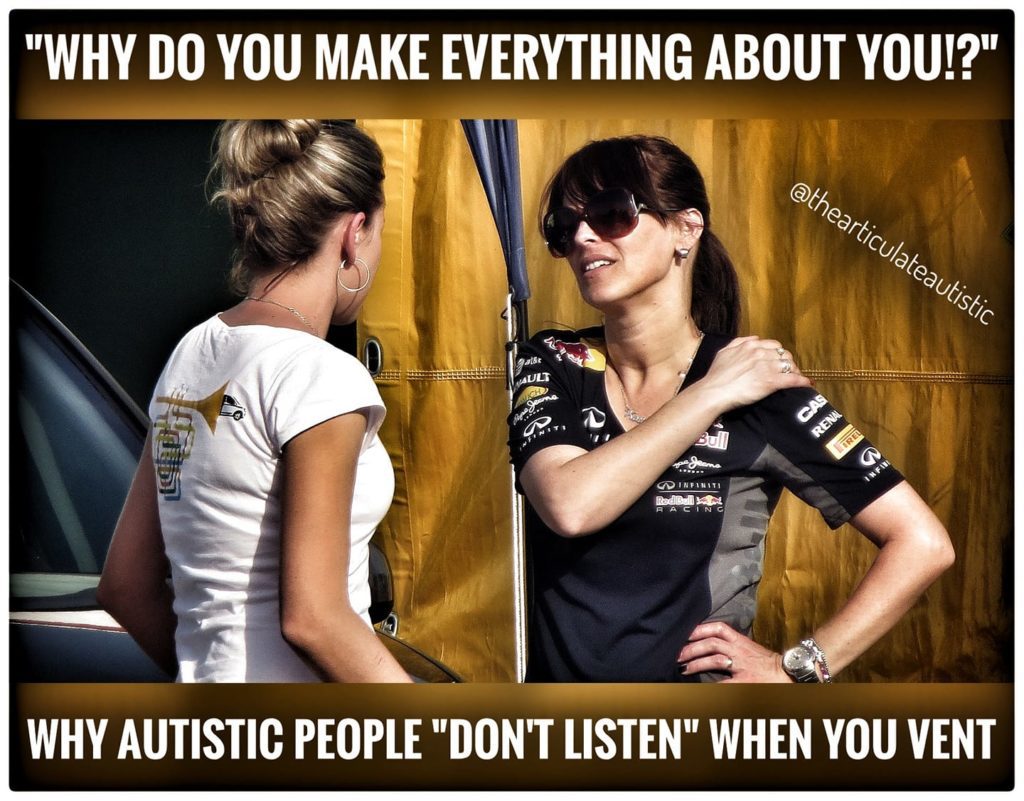A Look Inside the Autistic Brain While Conversing With a Neurotypical

I know there are so many memes and articles and anecdotes about how exhausting it is for an autistic person to converse with a neurotypical person, but I haven’t seen the experience actually broken down, and that’s what I want to do in this post.
So, here’s what happens:
Chelsea and Lea aren’t close friends, but they both have children and often speak casually at the park while their little ones are playing.
Chelsea is autistic, Lea is neurotypical. They both have one child each, Chelsea has a son named Bishop, Lea has a daughter named Heather. They’re both 5.
In this scenario, the two women are sitting on a park bench side by side while their little ones play close by on a very crowded jungle gym.
(Article continues below.)
The best way to improve communication with your autistic loved one is to understand how your autistic loved one’s mind works! Intentions, motivations, and personal expressions (facial expressions or lack thereof, body language, etc.), are often quite different in autistic people than they are in neurotypical people.
Experience a better understanding of your autistic loved one by reading books about life from an autistic perspective as well as stories that feature autistic characters. You’ll have so many “Ah ha!” moments and start seeing your autistic loved one in a different light (and you’ll have a better understanding of their behaviors, which you may have been misinterpreting up until now).
Books I recommend for a better understanding of your autistic loved one:
Lea (vigorously chewing a granola bar): “So, Heather did the cutest thing this morning–“
Chelsea (distracted by the sound of Lea chewing, which, to her ears, sounds like a herd of buffaloes stomping through thick mud in stereo): “Oh?”
Chelsea (to herself): ‘OK, look at the bridge of her nose. No, no! Not at the piece of granola that’s moving around on her top lip! Wait…what did she say? Oh, cute. Right, cute. Heather. Adorable child. Great cheeks. You could squeeze them for days. They’ve got a perfect marshmallow-like consistency…No! Focus!’
Lea (continuing): “–and then she smiled and said, “Oopsie!” Just like that! It was adorable!”
Chelsea (panicking to herself as the seconds tick by, Lea, still chewing, waits for a response): “Heather is always adorable!”
Lea beams with pride and takes a swallow of water from her water bottle. Chelsea winces at the thick, wet sound of saliva mixing with water and food as the sustenance glurps its way down her throat.
A child shrieks suddenly, and both mothers check to be sure neither of their children are hurt, Lea, thrusting her head forward and scanning the crowd of children, Chelsea, covering one ear with a finger as she squints through her sunglasses to see her child.
Both are fine. The shriek was a baby enjoying the sound of her own voice. The shrieking continues, and Chelsea winces in pain.
Lea (continuing a thought she started a moment ago): “–so we thought we’d go see that movie this Saturday–“
Chelsea (finger still jammed in one ear): ‘Wait, what’s the topic? Movies? OK. Sure. I got this.’) “I’m a really big fan of horror movies, but I hate gore.”
Lea (squinting her eyes at Chelsea in confusion): “No, I’m talking about the new rom-com that’s playing!”
Chelsea (panicking, holding her finger in her ear, trying to tune out the velociraptor child who is now reaching epic screeching heights): ‘Oh, God! Cover it! Cover it! Quick, her eyes are doing that thing again!’ Oh, I’m sorry. Yeah. What was the title again? Tim and I might go see that.”
Lea (still a bit confused): Layers Of Love. I thought you said your husband hated romantic comedies?”
Chelsea (‘OK, make your eyes big, blink fast, smile, grin, laugh…not that hard’): “Oh, I thought you said, Layers Of Blood!
Note: What Chelsea is doing here is called masking. This is a survival skills that many autistic people learn early on in life to keep us alive and uninjured (or less injured) in a neurotypical world. Learn more about it by clicking here and here.
Lea (taken aback and laughing nervously): “Yikes! I don’t want to know how there would be LAYERS of it!!”
Chelsea (‘OK, put your hand to your face and shake your head in a self-deprecating way’): “I know! Scary! I must have misheard you. Sorry about that. All the noise.”
Lea (looks at the playground and back to Chelsea): “Noise? Oh, ha ha! I’m so used to it, I don’t even HEAR it anymore!”
Chelsea (feeling tiredness crashing over her like a wave–she begins to detach from her environment, her face going slack, her eyes glazing over): “You really don’t hear it?”
Lea (concerned): “Are you OK?”
Chelsea (realizing, with horror, that the mask is slipping): ‘Your voice! It’s too monotone! Inflection! Inflection! Smile. Fix your eyes.’: “Yes, I’m fine. Just a bit tired.”
Lea (still concerned): “You know, you say that often. Do you have trouble sleeping? I do sometimes.”
Chelsea (not wanting to lie but feeling she has no choice): “Tim snores.”
Lea (a look of relaxed understanding crossing her face): “Ah, Gavin snores, too. Earplugs. Wear them. They will change your life!”
As if in cue, another child screams bloody murder.
Chelsea (wincing again): “I wish I had a pair right now!”
Lea (looking hurt and angry, getting up off the bench): “Heather?”
Heather runs over to her mom with a skinned knee, screaming and crying.
Chelsea (Oh, no! I just said that about her child making a noise for a legitimate reason. Yikes!)
Lea (comforting her daughter, but giving Chelsea a strange look)
Chelsea (unsure of what to do or say): “Is she OK?”
Lea (short and snappy): “She’s fine.”
Chelsea (floundering): ‘Abort mission. Abort mission! Get out! Make up a valid excuse to leave. Hurry!’: “I should get going. I’m getting a headache.”
Lea (mouth agape): “Well, jeez! I’m sorry my hurt and crying daughter is annoying you so much!”
Chelsea (embarrassed): ‘Oh, no! No! That’s not what I meant! Quick, explain! Explain!’ “Oh, no. Heather isn’t bothering me. That’s not what I meant. I’m just tired and have a headache. I wasn’t thinking. Is there anything I can do?”
Lea (raising an eyebrow): “No. I mean, it’s just a skinned knee. She’s OK.”
Chelsea (gets up from the bench and staggers a bit): “Bishop, honey!”
Bishop runs to his mother’s side. He seems tired and worn-out, too. Chelsea picks him up, and carries him to the car, muttering a weak ‘goodbye’ as she goes.
Lea watches her go and wonders if Chelsea is on drugs. If so, she doesn’t want that around her daughter. Maybe next week, she’ll take Heather to the park across town…
…
Neurotypicals, welcome to our nightmare.
These kinds of misunderstandings happen between the neurotypes every single day, and, over time, it can be incredibly wearing on both parties. This is why it’s so important to understand what’s going on on both sides of the aisle, so we can communicate more effectively and not cause each other stress and pain.
Follow me on Instagram.
Want downloadable, PDF-format copies of these blog posts to print and use with your loved ones or small class? Click here to become a Patreon supporter!










That’s why I don’t mask anymore. It’s a waste of time and energy, all to simply placate a neurotypical I don’t even want to talk to or be around, anyway, because of how boring and gross they are.